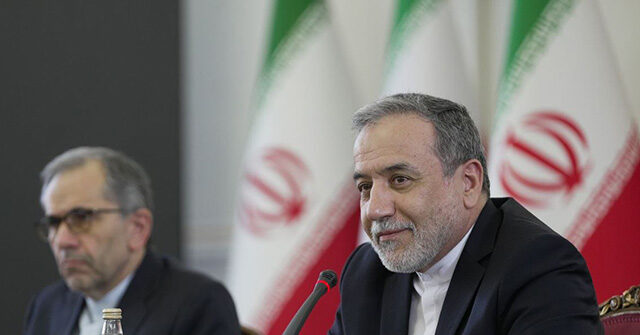The Iranian Foreign Ministry declared during its regular press briefing on Monday that it “expect[s]” United Nations member countries to simply ignore the reimposition of sanctions on the rogue Islamist regime the Security Council approved in late September.
France, the United Kingdom, and Germany began a process this summer to end sanctions relief for Iran initially implemented in 2015 as part of the Joint Comprehensive Plan of Action (JCPOA), the nuclear agreement spearheaded by former President Barack Obama. The International Atomic Energy Agency (IAEA), the U.N.’s nuclear watchdog agency, formally found Iran in breach of international law regulating nuclear development in June, resulting in the three JCPOA member countries to trigger “snapback” sanctions on Iran.
France, the U.K., and Germany signed the JCPOA alongside Iran, the United States, China, and Russia. The United States withdrew from the agreement in 2018; President Donald Trump cited Iran’s regular violations of agreement protocol, including limits on uranium enrichment, for the decision. China and Russia, both permanent Security Council members and close allies of Iran, were unable to stop the snapback sanction implementation on September 29.
The Chinese government sternly condemned the sanctions when the European countries began the process to reinstate them in August.
“Initiating the snapback process at the Security Council is not a constructive move, which will disrupt the settlement of the Iranian nuclear issue through political and diplomatic means,” Chinese Foreign Ministry spokesman Guo Jiakun said at the time. “China believes that current moves by the Security Council should contribute to resuming dialogue and negotiation rather than create new confrontation and lead to deterioration or even escalation of the situation.”
The Russian government declared it will formally ignore the Security Council mandate to impose sanctions.
“We do not recognize the snapback as coming into force,” Nebenzia said. “We’ll be living in two parallel realities, because for some snapback happened, for us it didn’t. That creates a problem. How we will get out of it — let’s see.”
Iranian Foreign Ministry spokesman Esmaeil Baghaei told reporters on Monday that Iran expects every other country in the United Nations to follow Russia’s lead.
“In line with the preservation of the principles of the United Nations Charter, we expect countries to refrain from complying with the three European countries’ move, which is considered a form of imposition on the structure of the Security Council,” Baghaei asserted, according to the Iranian propaganda outlet PressTV. Baghaei went on to call the sanction reimposition “irresponsible and destructive” and vow, “we will use all tools to secure the national interests of our country, and whenever we determine that diplomacy is effective and fruitful, we will not hesitate to use it.”
Baghaei noted that Iran has “no plans for negotiations” in the near future with the European JCPOA countries.
The spokesman used the opportunity to highlight that states have already confirmed their intention to abide by international law and impose the sanctions, specifically condemning fellow Islamist Turkey specifically.
“In our view, the step taken by Turkey, as reported in the media, was unnecessary and, based on the arguments we have made, is considered illegal, because the premises and assumptions underlying the action of the three European countries are all unlawful,” Baghaei claimed, according to the Iranian Tasnim News Agency.
According to the European Union, the sanctions reimposed include a ban on arms exports and any technology “that could contribute to Iran’s enrichment-related and reprocessing activities and ballistic missile programmes.” They also freeze all assets belonging to the Central Bank of Iran and ban Iranian cargo flights into the European Union, among other measures. In Turkey, Tasnim reported that the new sanctions will affect “the assets and bank accounts of 20 Iranian individuals and 18 entities, including organizations tied to nuclear fuel production, uranium enrichment, shipping, and energy.”
The outrage out of the Iranian Foreign Ministry on Monday followed comments by Foreign Minister Abbas Araghchi that downplayed the consequences of the sanctions, arguing that the snapback instead weakens European influence around the world.
“The three European countries thought they held leverage with snapback, but its use resolved nothing,” Araghchi claimed. “The three European countries have certainly diminished their role and lost their justification for negotiations. In any future talks, they will play a much smaller part.”
The path back to pre-JCPOA sanctions began this year when the head of the IAEA, Director-General Rafael Grossi, testified before the agency’s board that he could not confirm whether Iran was abiding by international law regarding nuclear development because the country was actively restricting inspects by the U.N. agency. Grossi also stated that the Iranian government was “sanitizing” uranium enrichment sites, leaving him to believe that they were using the site for illicit activities.
“Unfortunately, Iran has repeatedly either not answered, or not provided technically credible answers to, the Agency’s questions. It has also sought to sanitize the locations, which has impeded Agency verification activities,” Grossi asserted at the time.
The IAEA voted in June, following Grossi’s report, to hold Iran in breach of non-proliferation laws. European leaders began the process to reinstate “snapback” sanctions in August.
Read the full article here


